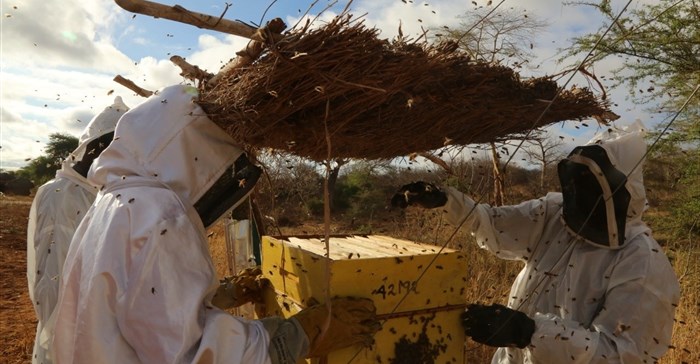Beehive fences in Kenya fend off elephants

The problem is elephants, or more specifically the human-elephant conflict that results when pachyderms follow their extraordinary sense of smell to track down juicy vegetables or harvested bags of maize from farmer's fields. Given the average elephant's appetite - they can consume up to 400kg of food a day - which can be devastating to rural subsistence farmers.
Picking the right fence
Electric or other fencing to keep elephants away from crops and villages is not always an ideal solution for many reasons, not least of which because it is expensive. Fences also cut wildlife corridors, result in over-grazing and permanent damage to ecosystems. Confining elephant herds can cause localised population explosions with potentially devastating consequences for the elephants, other wildlife and the ecosystem. Bees, on the other hand, are relatively easy to keep, don't disrupt wildlife migration, provide farmers with a source of income, and - most importantly - elephants dislike them.
Working together the David Sheldrick Wildlife Trust, zoologist Dr Lucy King and British Airways are establishing 'beehive fences' on five farms along the Mtito Andei River in Kenya. The river forms the boundary between local communities and the Tsavo East National Park, which lies in the south east of the country between Nairobi and Mombasa.
Addressing human-wildlife conflict
Initial talks began in 2013 with King, who works with Save the Elephants in Kenya, visiting some farmers in the area to see if it would be suitable for the project. On their own initiative, some Mtito Andei farmers had already started a group to deal with human-wildlife conflict in the area. The group was able to disseminate questionnaires and report back on incidents, enabling the project team to identify where elephants were raiding crops.
The farmers were desperate for a solution and, based on the success of King's research, very receptive to the idea. As a bonus, the local Wakamba tribe are avid bee keepers and were enthusiastic about getting modern beehives from which they could earn an income. So the project was rolled out, with British Airways community investment providing the funding. The airline, which has supported the David Sheldrick Wildlife Trust for the past decade, donated £5,000 specifically for the launch of the beehive fence pilot project in Mtito Andei a year ago.
Too soon to draw scientific conclusion
Neville Sheldrick, of the David Sheldrick Wildlife Trust, who has spearheaded the beehive fence project, says it's too soon to draw any scientific conclusions about its success, particularly as it has not yet been trialled through the wet season when there are large fields of maize to tempt hungry elephants. The data that King has collected from several years of research indicates that the fences are at least 80% effective, with only two of every ten elephants finding a way through.
"The farmers very much feel the fence is working. When I visit they proudly walk me around showing me the footprints of elephants that have walked up to and along the fence in several locations before turning back towards the park," says Sheldrick. "They certainly seem very happy with it, and we have been approached by neighbours who are eager to also be included in the project."
"This is exactly the sort of project we love to support," says Mary Barry, British Airways' head of community investment. "Long-term partnerships, such as the one with the David Sheldrick Wildlife Trust, allow us to positively respond to opportunities, in this case effecting a simple, clever solution that makes a meaningful difference."

























